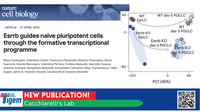Esrrb guides naive pluripotent cells through the formative transcriptional programme
Authors: Elena Carbognin, Valentina Carlini, Francesco Panariello, Martina Chieregato, Elena Guerzoni, Davide Benvegnù, Valentina Perrera, Cristina Malucelli, Marcella Cesana, Antonio Grimaldi, Margherita Mutarelli, Annamaria Carissimo, Eitan Tannenbaum, Hillel Kugler, Jamie A. Hackett, Davide Cacchiarelli & Graziano Martello
Year: 2023
Sources: Nature Cell Biology
Abstract:
During embryonic development, naive pluripotent epiblast cells transit to a formative state. The formative epiblast cells form a polarized epithelium, exhibit distinct transcriptional and epigenetic profiles and acquire competence to differentiate into all somatic and germline lineages. However, we have limited understanding of how the transition to a formative state is molecularly controlled. Here we used murine embryonic stem cell models to show that ESRRB is both required and sufficient to activate formative genes. Genetic inactivation of Esrrb leads to illegitimate expression of mesendoderm and extra-embryonic markers, impaired formative expression and failure to self-organize in 3D. Functionally, this results in impaired ability to generate formative stem cells and primordial germ cells in the absence of Esrrb. Computational modelling and genomic analyses revealed that ESRRB occupies key formative genes in naive cells and throughout the formative state. In so doing, ESRRB kickstarts the formative transition, leading to timely and unbiased capacity for multi-lineage differentiation.
Category: journals

